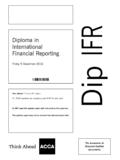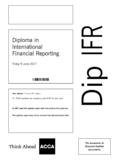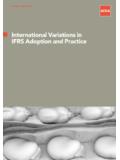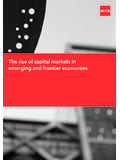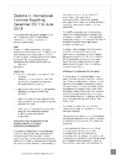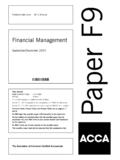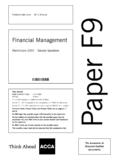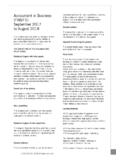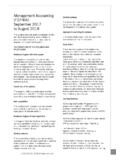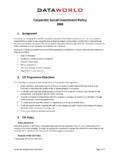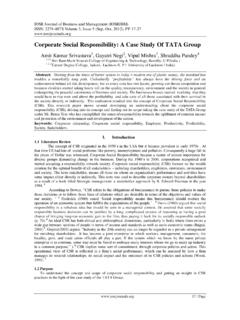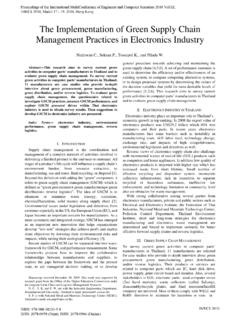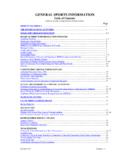Transcription of Mapping the sustainability reporting landscape
1 Mapping the sustainability reporting landscape Lost in the right direction The Association of Chartered Certified AccountantsMay 2016 This report explores the changing corporate sustainability reporting landscape , outlines its components, addresses current challenges and proposes development opportunities. It provides a considered overview of the trends, levers and drivers influencing the reporting landscape . It also proposes ideas to prompt discussion among professionals involved in reporting who seek standardisation, rationalisation and order.
2 About ACCAACCA (the Association of Chartered Certified Accountants) is the global body for professional accountants. It offers business-relevant, first-choice qualifications to people of application, ability and ambition around the world who seek a rewarding career in accountancy, finance and management. ACCA supports its 178,000 members and 455,000 students in 181 countries, helping them to develop successful careers in accounting and business, with the skills required by employers. ACCA works through a network of 95 offices and centres and more than 7,110 Approved Employers worldwide, who provide high standards of employee learning and development.
3 Through its public interest remit, ACCA promotes appropriate regulation of accounting and conducts relevant research to ensure accountancy continues to grow in reputation and influence. More information is available at: CDSB The Climate Disclosure Standards Board (CDSB) is an international consortium of business and environmental NGOs. We are committed to advancing and aligning the global mainstream corporate reporting model to equate natural capital with financial do this by offering companies a framework for reporting environmental information with the same rigour as financial information.
4 In turn this helps them to provide investors with decision-useful environmental information via the mainstream corporate report, enhancing the efficient allocation of capital. Regulators also benefit from compliance-ready that it is equally essential to have information about both natural capital and financial capital for an understanding of corporate performance, our work builds trust and transparency needed to foster resilient capital markets. Collectively, we aim to contribute to more sustainable economic, social and environmental systems.
5 The author Lois GuthrieLois is the Founding Director of CDSB and is responsible for CDSB s work to develop a framework to report environmental information in mainstream corporate reports. Previously, Lois was Technical Director at Zurich Insurance Group, as well as Technical Director to the International Integrated reporting Council (IIRC).FOR FURTHER INFORMATION, PLEASE CONTACT:Jimmy GreerSenior Manager Professional Insights, ACCA+44 (0)20 7059 report sets out how to take on the current challenges facing a fragmented sustainability reporting the corporate sector determine which particular piece of guidance is most applicable to their needs, the report sets out a high level (demand-driven)
6 Framework for determining which reporting path to choose and then reinforces that framework with practical application subtitle of the report Lost in the right direction is an acknowledgement that, as far as reporting on sustainability is concerned, we are moving in what seems like the right direction but we are perhaps still somewhat uncertain about our final destination. Is it US GAAP supported by the new SASB standards? Is it GRI 6? Is it <IR 3> or is it some stakeholder-determined amalgam of all these (and others)? It may well be that the end result will not be the perfect please-everybody solution grounded in unshakeable logic that we dream of but, rather, a pragmatically variegated solution driven equally by the shifting politics of standard setting and the tensions inherent in the sustainability versus shareholder wealth debate.
7 Whichever it is, this report provides us with a useful sustainability compass to help us traverse the constantly shifting corporate sustainability KellyVisiting Professor Finance & Accounting Strathclyde UniversityICRS FellowSince the mid-1990s, ACCA has regularly published research that guide and inform both preparers and board members on how to produce reports that seek to provide greater transparency on the performance of enterprises. An initial focus on environmental aspects was followed by the inclusion of social issues and, more recently, sustainability considerations.
8 Navigating one s way through the increasingly complex landscape of sustainability reporting standards, regulations and voluntary initiatives often seems a daunting task. It therefore gives me great pleasure to introduce and welcome this new guidance from the Climate Disclosure Standards Board (CDSB).CDSB has brought together highly competent (yet potentially competing) organisations together under the same progressive banner. The CDSB s own climate change disclosure recommendations have been extremely influential at both the corporate and governmental this report CDSB sets out to demonstrate how society s changing expectations of the corporate sector have been matched by the emergence of a range of new reporting guidance, some voluntary, some mandatory.
9 To help those ContentsExecutive summary ..6 Introduction ..10 Chapter 1 The changing corporate reporting landscape ..13 Chapter 2 Components of the sustainability reporting landscape ..17 Chapter 3 sustainability reporting landscape challenges ..26 Chapter 4 Possible routes forward ideas for bringing order to sustainability reporting ..32 References ..416 The purpose of corporate reports is to communicate the reporting organisation s performance over the reporting period, whether for compliance or stakeholder information purposes.
10 There is no universally agreed definition of performance but, most simply, it can be understood as the end result of management s processes and actions in relation to corporate goals. Over the last few decades there have been significant changes in government and societal expectations about the goals that businesses should be setting and the criteria that should be applied to identify good and poor corporate performance. This has prompted significant changes in corporate reporting requirements and practices and in the infrastructure developed to enable reporting , including the publication of new reporting frameworks, protocols and guidance, the creation of organisations to encourage and monitor new reporting practices and the emergence of multi-disciplined approaches Executive summaryOver the last few decades there have been significant changes in government and societal expectations about the goals that businesses should be setting.
